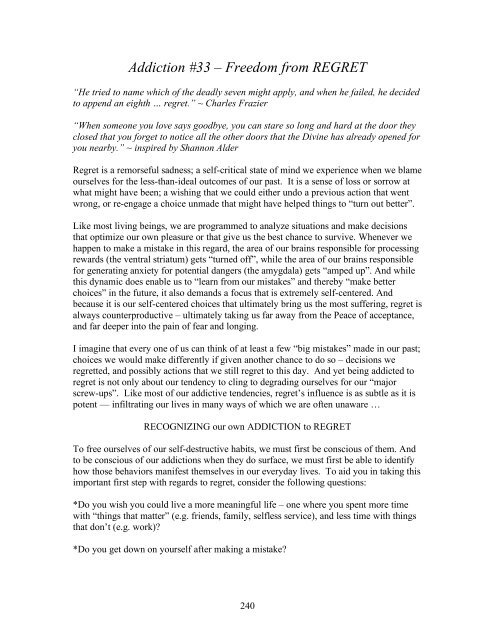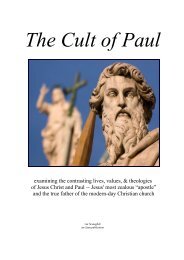Licking the Razor's Edge (2015)
Recognizing the hidden addictions that bind you, … to then set your True Self free
Recognizing the hidden addictions that bind you,
… to then set your True Self free
You also want an ePaper? Increase the reach of your titles
YUMPU automatically turns print PDFs into web optimized ePapers that Google loves.
Addiction #33 – Freedom from REGRET<br />
“He tried to name which of <strong>the</strong> deadly seven might apply, and when he failed, he decided<br />
to append an eighth … regret.” ~ Charles Frazier<br />
“When someone you love says goodbye, you can stare so long and hard at <strong>the</strong> door <strong>the</strong>y<br />
closed that you forget to notice all <strong>the</strong> o<strong>the</strong>r doors that <strong>the</strong> Divine has already opened for<br />
you nearby.” ~ inspired by Shannon Alder<br />
Regret is a remorseful sadness; a self-critical state of mind we experience when we blame<br />
ourselves for <strong>the</strong> less-than-ideal outcomes of our past. It is a sense of loss or sorrow at<br />
what might have been; a wishing that we could ei<strong>the</strong>r undo a previous action that went<br />
wrong, or re-engage a choice unmade that might have helped things to “turn out better”.<br />
Like most living beings, we are programmed to analyze situations and make decisions<br />
that optimize our own pleasure or that give us <strong>the</strong> best chance to survive. Whenever we<br />
happen to make a mistake in this regard, <strong>the</strong> area of our brains responsible for processing<br />
rewards (<strong>the</strong> ventral striatum) gets “turned off”, while <strong>the</strong> area of our brains responsible<br />
for generating anxiety for potential dangers (<strong>the</strong> amygdala) gets “amped up”. And while<br />
this dynamic does enable us to “learn from our mistakes” and <strong>the</strong>reby “make better<br />
choices” in <strong>the</strong> future, it also demands a focus that is extremely self-centered. And<br />
because it is our self-centered choices that ultimately bring us <strong>the</strong> most suffering, regret is<br />
always counterproductive – ultimately taking us far away from <strong>the</strong> Peace of acceptance,<br />
and far deeper into <strong>the</strong> pain of fear and longing.<br />
I imagine that every one of us can think of at least a few “big mistakes” made in our past;<br />
choices we would make differently if given ano<strong>the</strong>r chance to do so – decisions we<br />
regretted, and possibly actions that we still regret to this day. And yet being addicted to<br />
regret is not only about our tendency to cling to degrading ourselves for our “major<br />
screw-ups”. Like most of our addictive tendencies, regret’s influence is as subtle as it is<br />
potent — infiltrating our lives in many ways of which we are often unaware …<br />
RECOGNIZING our own ADDICTION to REGRET<br />
To free ourselves of our self-destructive habits, we must first be conscious of <strong>the</strong>m. And<br />
to be conscious of our addictions when <strong>the</strong>y do surface, we must first be able to identify<br />
how those behaviors manifest <strong>the</strong>mselves in our everyday lives. To aid you in taking this<br />
important first step with regards to regret, consider <strong>the</strong> following questions:<br />
*Do you wish you could live a more meaningful life – one where you spent more time<br />
with “things that matter” (e.g. friends, family, selfless service), and less time with things<br />
that don’t (e.g. work)?<br />
*Do you get down on yourself after making a mistake?<br />
240


















